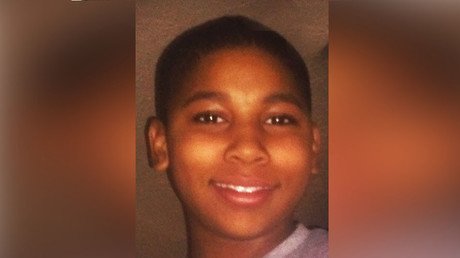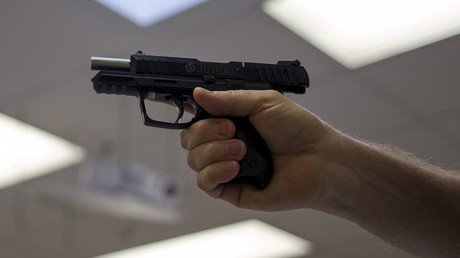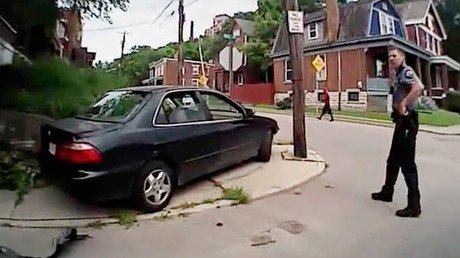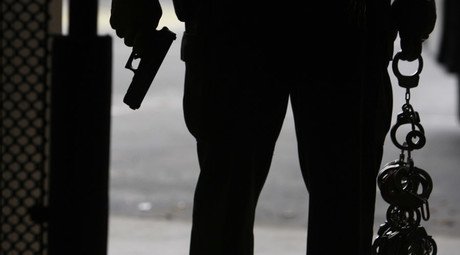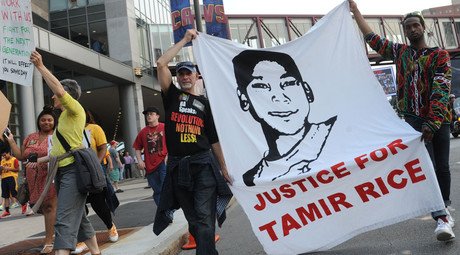Cleveland ordered to pay $6mn to family of Tamir Rice, 12yo fatally shot by police
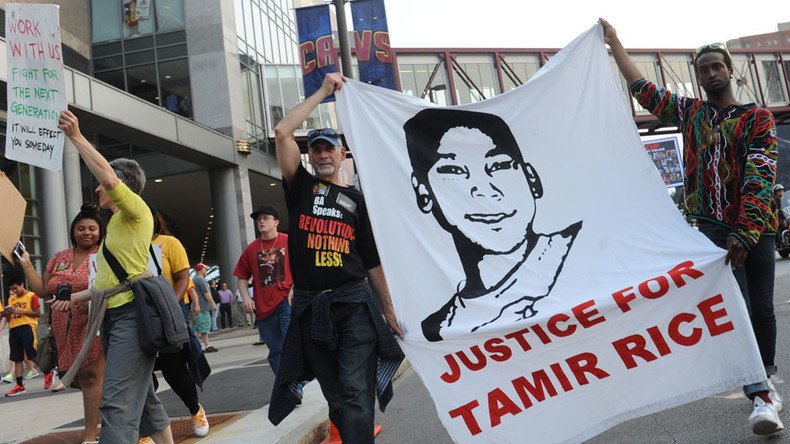
The city of Cleveland will pay $6 million to the family of Tamir Rice, a 12-year-old boy fatally shot by police in 2014, based on a settlement agreement that allows the city to avoid a high-profile federal civil rights trial.
Lawyers for Rice's family said Monday that "no amount of money can adequately compensate" for the boy's loss.
“In a situation like this, there’s no such thing as closure or justice,” attorneys Jonathan S. Abady and Earl S. Ward in a said statement, according to the New York Times. “Nothing will bring Tamir back. His unnecessary and premature death leaves a gaping hole for those who knew and loved him that can never be filled.”
The agreement, which must still be approved by a probate court, was announced early Monday. The city of Cleveland – including officers and police dispatchers involved in the incident – does not admit any wrongdoing based on the terms of the settlement, according to reports.
Last year, a Cuyahoga County grand jury decided against indicting Cleveland Police Officer Timothy Loehmann, who fired at Rice on November 22, 2014, outside a city recreation center. A 911 call to police had reported a male holding a gun that was "probably fake." This information was not passed on to police sent to the scene.
Rice had an Airsoft replica that lacked an orange safety feature that would have indicated it was not real. Loehmann shot at Rice almost immediately after exiting his squad car, claiming Rice had reached for his waistband. Rice, shot once in the torso, was not offered first aid by the officers and died the following day.
The settlement, revealed in a court filing from US District Judge Dan Polster, calls for a total of $5.5 million to go to Tamir Rice's estate, with Tamir's mother, Samaria Rice, and sister, Tajai Rice, to receive $250,000 each. Tajai Rice, 15, was with Tamir at the Cudell Recreation Center the day her brother was killed. Surveillance footage of the shooting shows her running to be near her brother once he was shot. Officer Frank Garmback, Loehmann's partner, stopped her and forced her to the ground. The officers handcuffed her and put her in the back of their squad car as her brother lay dying mere feet away.
MY HEART BREAKS EVERY TIME I THINK OF TAMIR. ONLY 12 AT A PLAYGROUND. COPS SHOT HIM LIKE A BANK ROBBER#TamirRicepic.twitter.com/QDby1C0kxN
— STARSUN RECORDS (@STARSUNLLC) April 25, 2016
The city will pay $3 million this year and $3 million in 2017. The Rice family agreed in March to enter settlement talks with Cleveland. The city of Cleveland has not commented on the settlement, according to the Cleveland Plain Dealer.
$6M won't bring back #TamirRice. Cleveland hired a bad cop, didn't train him properly, watched him kill a kid, and shielded him from charges
— Brendan Peter Miller (@brendanpmiller) April 25, 2016
Cuyahoga County Prosecutor Timothy J. McGinty has come under much scrutiny for his handling of Rice's killing. Prior to the grand jury proceedings, McGinty hired two police use-of-force experts to write reports on Rice's killing. Both reports found police acted reasonably during the encounter. McGinty's office also asked several experts to officially comment on the legality of the shooting; they all said the officer used justifiable force in shooting Rice.
The Rice family has accused McGinty of soliciting expert reports to "make opinion early to soften the blow" ahead of a grand jury decision exonerating the officers involved, while McGinty has openly questioned the motives of the Rice family's attorneys.
Two independent experts have countered, saying the shooting was unjustified. “The officers engaged in reckless tactical decision making, they unreasonably placed themselves in harm’s way, and Officer Loehmann’s use of deadly force was excessive, objectively unreasonable and inconsistent with generally accepted police practices,” wrote Jeffrey J. Noble, a former deputy police chief in Irvine, California.
In late December 2015, following a recommendation from Prosecutor McGinty, a grand jury decided against indicting Loehmann, saying the officer had a "mistaken, yet reasonable belief” he would be shot when Rice pulled the replica gun from his waistband.
Upon the decision, McGinty called the shooting a “perfect storm of human error, mistakes and miscommunications” but said that the evidence did not point to criminal misconduct by police.
Rice’s death came only two days after a grand jury in St. Louis County decided not to indict Darren Wilson, a former officer with the Ferguson Police Department in Missouri, over an August 2014 incident in which Wilson fatally shot unarmed black teenager Michael Brown. The fatal police shootings of both Rice and Brown, as well as many other people of color in the US, have triggered mass demonstrations against racial profiling, police brutality, police impunity, and the overall police-court-prison system in America.
The US Department of Justice is reviewing Rice's shooting to surmise whether officers committed federal civil rights violations. Yet, to prove such violations occurred is not easy. To successfully bring federal civil rights charges, a US prosecutor must prove an officer was not negligent or reckless but that he or she "willfully" deprived someone of their rights.
A March analysis by the Pittsburgh Tribune-Review found that, from 1995 to 2015, federal prosecutors chose not to levy charges against US law enforcement officers alleged to have committed civil rights violations in 96 percent of relevant cases.
The settlement comes as the latest in a string of agreements between major US police departments and loved ones of fatally shot individuals killed by police in efforts to avoid a public court case following a wrongful-death lawsuit.
Last year, Baltimore agreed to pay $6.4 million to the family of Freddie Gray, who died inside a police van. In July, the family of Eric Garner, who died after he was put in a chokehold by New York City police for selling individual cigarettes on the street, was paid $5.9 million. The family of Walter Scott, fatally shot in the back by a South Carolina officer amid a traffic stop, settled with North Charleston for $6.5 million in October.
